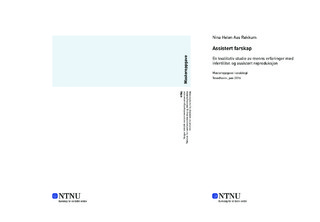| dc.description.abstract | In this thesis I explore the ways in which men experience infertility and assisted reproduction, and what this can tell us about changing masculinities in Norway. We live in a time where assisted reproductive technologies (ARTs) create new possibilities to become a parent. At the same time the meanings of fatherhood are changing in the Norwegian society. These developments can influence how men experience infertility. Inspired by the PhD thesis of Kristin Spilker (2008), I use the term assisted fatherhood, to describe new ways in which men can become fathers through using ARTs. Based on multi-sited ethnography I conducted indepth interviews with five infertile men, and fieldwork consisting of expert interviews, guided clinical tours, and public documents on infertility.
Important findings include an understanding of assisted fatherhood as a biographical process. Infertility was experienced as a biographical disruption, in which expectations towards fatherhood were put on hold. By embracing ARTs the men experienced a biographical continuity, because they could continue on an alternative route to fatherhood. In this process, masculinity was at stake. Fatherhood was both a desired life goal and an important part of being a man. When confronted with infertility, their masculinity was fragile, and did not match up to hegemonic masculinity. By embracing ARTs the men (re)constructed their masculine identities, to confirm themselves as men and fathers. In this (re)construction process they used masculine strategies as “project managers” and “supportive partners,” characterized by caring. I also found that men talked a lot about their feelings, using metaphors such as a “mountain trip” and an “emotional roller coaster,” to describe how they felt about the treatment process. Another finding was a split understanding of their sexual lives. As infertile their sexual lives were mechanical, while ARTs led to a liberating sexuality. All together, the findings in this study reflect a broader picture of how masculinities are changing in contemporary Norway.
Social research on infertility is far more likely to be focused on the understandings and experiences of women than those of men. As a consequence of this, men are viewed as the second sex in reproduction. This study shows that there is a need for more research on the reproductive lives of men. | nb_NO |

